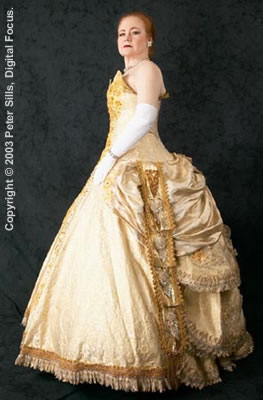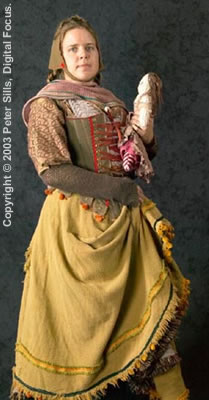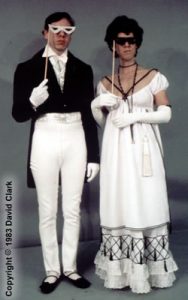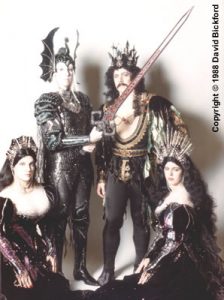CC21-H-07: Cardoon: A Peasant
CC21-H-07: Cardoon: A Peasant | Division: Novice | Category: Hist. Interpretation | Designer(s): Rita Plumb | Maker(s): Rita Plumb | Presenter(s): Rita Plumb | Workmanship Award(s): Best Inventive Use of Materials | Presentation Award(s): Best Example That Brevity is the Soul of Wit (Photo ID: Peter Sills, Digital Focus | Event Date: 2003)
Competition Staff & Rules
Staff:
- Director: Nancy “Needles” Mildebrandt
- Master of Ceremonies: Greg Rihn
- Presentation Judges: Karen Bergquist and Nancy E. Mildebrandt
Rules:
The Costume-Con 21 Historical Masquerade will take place on Sunday, April 20, 2003. A historical costume is simply clothing of the past–any era, any country, any culture. The definition of the past, though, varies depending on the costumer. (Basically, anything that dates back farther than the birth year of the costumer qualifies.)
Categories and Skill Divisions
The Historical Masquerade has two broad categories, Historic Reproduction and Historic Interpretation. It also has several skill divisions (novice, journeyman, master) within each category.
Historic Reproduction: This category hosts those costumes that attempt to reproduce actual historic clothing in as much detail as possible. These costumes use the same materials (or as close as possible) that would have been used in the era from which the costume originates. The costume model will he expected to be dressed “from the inside out” meaning that he/she will be expected to wear the exact undergarments that would have been worn in the era. This category relies heavily on documentation to help the judges do their work. (More on documentation shortly.) Both actual clothing and historical film/theatre costumes fit here.
Historic Interpretation: This class has those costumes that use historic dress as a basis but intentionally, visually departs from the era in which it is based, in other words, it’s not as accurate a category as Historic Reproduction– one doesn’t have to use period-accurate materials or techniques, and one doesn’t have to wear period-accurate underpinnings. Documentation, however, is encouraged, if for no other reason than to give the judges a basic understanding of where the design originated.
Skill Divisions: The Skill Divisions for the Historical Masquerade closely resemble the Skill Divisions for the Fantasy and Science Fiction Masquerade. Most entries will be placed in the ICG standard divisions of Novice, Journeyman and Master. A group entry will be placed in the division appropriate for its most experienced member.
Master:
* Any competitor may enter in the Master division.
Journeyman:
* Professional costumers may not enter in the Journeyman division.
* A contestant who has competed and won in the Master division at an international competition may not enter in the Journeyman division.”
* A contestant who has won “Best in Show” or “Best Journeyman” at an international competition may not enter in the Journeyman division.”
*A contestant who has won more than three major awards in the Journeyman division in international competition may not enter in the Journeyman division.”
Novice:
* Professional costumers may not enter in the Novice division.
* A contestant who has competed and won in any division other than Novice at an international competition may not enter in the Novice division.
* A contestant who has won “Best in Show” or “Best Novice” at an international competition may not enter in the Novice division.
* A contestant who has won more than two major awards in the Novice division at international competitions may not enter in the Novice division
For this masquerade, any person who made more than 1/3 of his or her annual income by costuming in any of the last 5 years qualifies as a “professional.” “International competition” means “World Con Masquerade or Costume-Con Fantasy and Science Fiction or Historical Masquerade.” “Major awards” includes any awards that do not feature “Honorable Mention” in the name.
Competitors under 15 who have participated in the design and creation of their costume may enter in the “Young Fan” division. Adult-designed and constructed costumes presented by children may be entered in the maker’s division or the Exhibition division (not in competition).
Any competitor may enter in a more advanced division than he or she is placed.
Any competitor has the option to enter in the Exhibition division (not in competition).
Note: if you have never constructed a Historical Costume, please contact the Historical Masquerade Director about competing at one level down from your normal level.
Documentation
Next to the costume itself, documentation is the most important thing to produce for the Masquerade. Documentation allows the judges to become both familiar with the garment itself and the research and construction that went into making the garment. All costumers must submit documentation in order to compete.
Although the phrase “documentation” sounds daunting, it really isn’t. In its simplest form, documentation merely explains in a cohesive manner the garment design and method of wearing, the construction materials and process, and the choices (if any) in material substitution. A costumer making a historical garment will have all this information at hand to begin with; it’s merely a matter of presenting the information in a way that others can understand it.
Some documentation tips to keep in mind:
Your base documentation should be no longer than three double sided pages, or six single sided pages. There is, however, no limit on how much additional info you wish to include. Please keep in mind that the judges will have an extremely limited amount of time to read the documentation, in other words, keep it as short as possible.
Please present your documentation on 8 ½ x 11″ paper, spiral bound with covers. Illustrations may be on separate pages or integrated with the text. Do not provide entire books as part of your documentation process. Instead, either photocopy the relevant pages and include them in the documentation or simply [cite] them.
Documentation will need to be turned in along with your registration forms by Friday, April 18 by 9:00 PM. If you arriving after this deadline, please contact the Historical Masquerade Director to make special arrangements.
Presentation and judging
All Historical Masquerade participants should be prepared to have his/her work pre-judged. “Pre-judging” means that the participants will make an appointment to have the judges examine their garments and to ask questions. The details on prejudging will be announced in Progress Report #3.
The rules for the Masquerade presentation itself suspiciously resemble the rules for the Fantasy/Science Fiction Masquerade. They are:
1. All masquerade contestants must be attending members of CC21. If the maker and presenter are different people, both must be attending members. Purchased and rented costumes may not be entered.
2. A costume may not be entered in competition if it has won “Best in Show” or “Best in Division” at an ICG-recognized international competition, it may be entered in the Exhibition division (not in competition).
3. Each presenter may only appear on stage in a single masquerade entry. One body, one presentation.
4. The standard PG rule applies. No costume is “no costume.”
5. No live animals are allowed on stage with the exceptions of a) people and b) service animals.
6. No materials or effects that will leave a mess on stage or in the green room are allowed. No effects that may ruin another entrant’s costume are allowed.
7. No pyrotechnics or any other type of open flame[s] are allowed.
8. All special effects must be reviewed with the Masquerade Director before or at rehearsal (again, the earlier, the better).
9. Rehearsal is required. You need it to get a feel for the stage. We need it to make sure your tech is right, and to make sure the crew knows what to expect from your entry. Stage rehearsal will take place throughout Sunday.
10. If you’re going to have large props, bring your own ninjas to get them on and off stage. Bring them to rehearsal too.
11. Individual entries are granted 60 seconds on stage. Group entries are granted 90 seconds on stage. Additional time may be granted if you can show the Masquerade Director that you will use it well. Requests for additional time should be made early (i.e. as soon as you know how long you want). Last-minute requests (any point after your paperwork is turned in) will not be looked upon favorably.
12. Don’t plan for complex lighting. We don’t plan to have it. If you wish anything other than default lighting, discuss it when you check in with the Masquerade Director, and also with the crew at rehearsal.
13. Don’t plan to use a microphone. During presentations, the MC is the only person with a microphone. Spoken narrative may be pre-recorded or in the form of a script for the MC (24pt type preferred). Spoken dialog must be pre-recorded.
14. Pre-recorded material may be on tape or CD. If you are providing a CD, make sure it only includes the material you wish to use on track 1 (no commercial CDs). If you are providing a tape, same deal, and make sure your material is recorded at the start of both the A-side and B-side.
Final Thoughts
We welcome your questions about this competition. Please feel free to contact the Masquerade Director, Nancy Mildebrandt, either through the con post office box or via email at (Removed).




